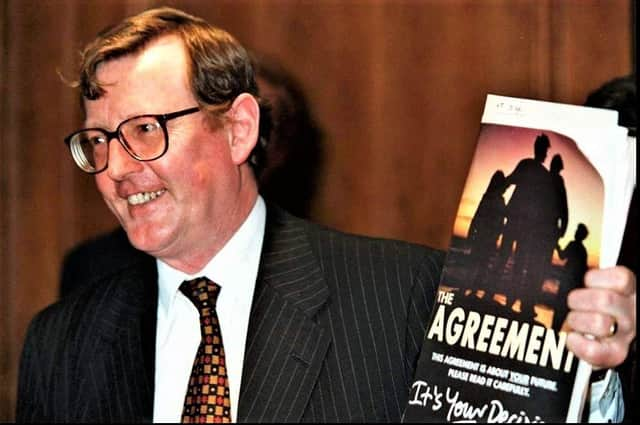Jamie Bryson: Trimble was one of the most intelligent unionists who ever lived and his anti-Protocol stance showed him to be a man of conviction


As part of the intra-unionist debate on this issue, the later-to-become-Lord Trimble said “Northern Ireland’s place within the United Kingdom has been secured. The Act of Union, the fundamental piece of legislation defining Northern Ireland’s position within the United Kingdom, remains firmly in place. The Act of Union is the Union.”
That it was primarily upon this basis David Trimble was able to deliver the Belfast Agreement can not be seriously contested. Indeed, in his affidavit in the Protocol case known as Allister et al, Lord Trimble expressly made clear that the core bedrock upon which pro-Agreement rested was that Northern Ireland’s constitutional status (defined by the Act of Union) had been secured.
Advertisement
Hide AdAdvertisement
Hide AdLord Trimble also spoke of the uncomfortable issues which the unionist community had to swallow in exchange for this purported constitutional safeguard.
However, the acid bath of the Protocol brought clarity to the true nature of the purported principle-of-consent safeguard. It did not, as David Trimble was led to believe in 1998, operate to protect the constitutional status of Northern Ireland but rather merely directed itself to the final formal handover of sovereignty.
This is so because the Protocol was able to bypass the principle of consent and “subjugate” Northern Ireland’s place within the United Kingdom by virtue of overriding the Act of Union – which David Trimble rightly identified as “the Union”.
Put simply, when it comes to Northern Ireland’s constitutional status, you can change everything but the last thing; the last thing being merely the final formal handover of sovereignty.
Advertisement
Hide AdAdvertisement
Hide AdThis is not what David Trimble believed he had agreed in 1998, and in turn it was not what pro-Agreement unionism believed had been secured.
Therefore, the only logical conclusion is that even pro-Agreement unionism’s support for the Belfast Agreement is based upon that which has been exposed as a fundamental deception.
It is disappointing that the modern UUP have never been able to confront this issue with the same type of intellectual honesty and rigour as that displayed by Lord Trimble in his Protocol legal challenge affidavits.
Pro-Agreement unionism must accept that they were deceived in 1998, and thus inadvertently deceived those they persuaded. In some respects Lord Trimble squarely grappled with this issue, saying he felt betrayed by the Protocol.
Advertisement
Hide AdAdvertisement
Hide AdIt is true to say that Lord Trimble did not disavow the Belfast Agreement as he sincerely believed it was agreed, but his expressions of betrayal would seem to illuminate a realisation that what he believed he had agreed was not in fact replicated in the provisions which give effect to the Agreement.
In this context, it is difficult to see how it can credibly be suggested (as was last week by David Burnside and others) that pro-Agreement unionism got it right in 1998. They plainly did not; they were deceived and the core basis upon which their support for the Agreement rests is based upon a fatally flawed belief that the principle of consent did something that it transpires it does not in fact do.
It is to the credit of Lord Trimble that he was unrelenting in challenging and exposing the betrayal of unionism in how the Belfast Agreement has worked out. He did not seek to continue advocating support for the flawed basis upon which the Agreement rests (on a principle of consent that is merely symbolic) but rather he squarely confronted this deception.
The intellectual honesty displayed by Lord Trimble in his analysis of the destructive Protocol points clearly towards a man of conviction and genuine belief. He supported the Belfast Agreement because he thought it was the right thing to do, but when it transpired unionism had been deceived, he – without any equivocation – called attention to this issue, rather than seeking to conceal it and in doing so protect the legacy of his own decisions in 1998.
Advertisement
Hide AdAdvertisement
Hide AdIn filing the affidavit that he did, he bestowed his significant moral and intellectual credibility on the anti-Protocol campaign. We should be eternally grateful for that.
In my view, unionism got it wrong in 1998. That cannot seriously now be contested given the exposure of the principle of consent as “a deceptive snare” in the words of John Larkin QC on behalf of the applicants in the pan-unionist Protocol challenge in Allister et el.
There is significant portions of Lord Trimble’s affidavit quoted throughout both the High Court and Court of Appeal Protocol judgments. I hope someday the entire affidavit will be published.
It is a remarkable final testimony by one of the most consequential and intelligent figures in the history of Unionism.
For more opinion, click here
Advertisement
Hide AdAdvertisement
Hide AdFor some news stories you won’t read anywhere else, click here: